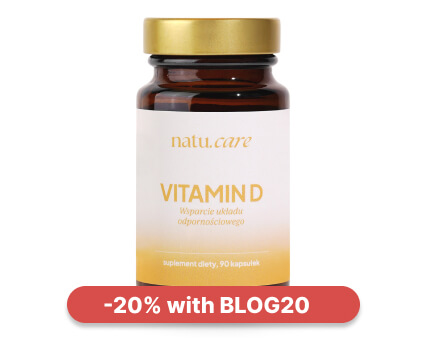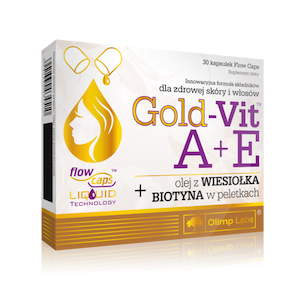- Home
- Vitamins
Vitamins - which are the most important? [+resources and supplementation].
Vitamins are organic compounds without which our body cannot function properly. Check out the most important information about each of them.


Learn more about our editorial process
.

Learn more about our editorial process
.

Learn more about our editorial process
.

Learn more about our editorial process
.![Vitamins - which are the most important? [+resources and supplementation].](https://cdn-resources.natu.care/uploads/1/selen_hero_5394ca8a76.jpg)
Why you can trust us
Articles on Natu.Care are written based on scientific research, data from government websites and other reliable sources. The texts are written in cooperation with doctors, nutritionists and other health and beauty experts. Articles are reviewed before publication and during significant updates.
.Learn more about our editorial process
.Information about advertisements
Content on Natu.Care may contain links to products from the sale of which we may receive a commission. When creating content, we adhere to high editorial standards and take care to be objective about the products discussed. The presence of affiliate links is not dictated by our partners, and we select the products we review ourselves completely independently.
.Learn more about our terms and Conditions
.Vitamins are like superheroes. They are key defenders of health, working in secret, silently. You know they're important and you need to make sure they're in the right concentration in your body. But... well, exactly, but why?"
.Ahead of you is a compendium of vitamin knowledge, prepared in collaboration with clinical nutritionist Julia Skrajda. You will get to know each vitamin and see its true value.
From this article you will learn:
- The most important things about each vitamin. .
- What vitamins are worth supplementing. .
- How to find out if you are suffering from a vitamin deficiency or excess.
- How to find out if you are suffering from a vitamin deficiency or excess.
See also:
.- Best vitamin D3
- Vitamin D3 drops
- B vitamins
- Vitamin C (ascorbic acid) .
- Vitamin B1 (thiamine) .
- Vitamin B2 (riboflavin) .
- Vitamin B3 (niacin)
- Vitamin B5 (pantothenic acid)
- Vitamin B6 (pyridoxine) .
- Vitamin B7 (biotin) .
- Vitamin B9 (folic acid) .
- Vitamin B12 (cobalamin) .
- Vitamin A .
- Vitamin D3 .
- Vitamin E
- Vitamin K
- Vitamin K2
What are vitamins?
.Vitamins are a group of organic chemical compoundsand. They are essential for the body to function properly. Your body cannot synthesise them (there is an exception to this rule, but about it below) so vitamins need to be taken in with your diet or supplements.
There are two groups of these compounds - water-soluble vitamins, i.e. the B vitamins and vitamin C, and fat-soluble vitamins, i.e. all the others.
How many vitamins are there?
.There are 13and compounds that are considered vitamins. Then there is the so-called vitamin B17 (amigdalin) once used as a cure for cancer. Despite its name, this compound is not classified as a 'real' vitamin .
Note
.Vitamin B17 (amigdalin) shows only minor anti-cancer effectsand. Moreover, the side effects of its use are dangerous and include symptoms such as nausea, vomiting, headaches and fever.
Water-soluble vitamins
.Water-soluble vitamins are absorbed almost immediately by the body. In turn, their excess is removed with the urine. Therefore, an overdose of these compounds is not common, but possible. Water-soluble vitamins include the B vitamins and vitamin C.
Vitamin C
.Vitamin C is responsible for the immune system, promotes wound healing, and protects against free radicals. It is essential for the proper functioning of the body.
Properties of vitamin Cand:
- increases immunity, .
- reduces the risk of chronic diseases, .
- protects memory, .
- prevents iron deficiency, .
- lowers the risk of heart disease, .
- controls blood pressure, .
Omega acids, especially omega-3, are also responsible for the prevention of heart disease.You will learn more about them from these articles:
- Omega acids - what they are, types, properties, deficiency
- Omega-3s: characteristics, effects, use, types .
Resources
.Vitamin C is mainly associated with lemon and citrus. But it is present, often in higher concentrations, not only in fruits with the letter C.
Sources of vitamin Cand:
- citrus (orange, kiwi, grapefruit), .
- strawberries, .
- tomatoes, .
- apricots, .
- potatoes, .
- brown Brussels sprouts, .
- cabbage, .
- broccoli, .
- cauliflower, .
Supply and surplus
.Deficiency and excess of vitamin C is dangerous for all of us. Too little of this vitamin in the body manifests itself as poorer immunity, slower wound healing, rough skin or weakened bonesand. The classic extreme effect of vitamin C deficiency is scurvy . Symptoms of excess, on the other hand, include headaches, vomiting, diarrhoea or nausea.
Taking too high a dose of vitamin C can result in falsified results of certain tests, e.g. blood glucose or creatinine levels..
 .
.
Julia SkrajdaDietitian
.Natu.Care Collagen Premium
.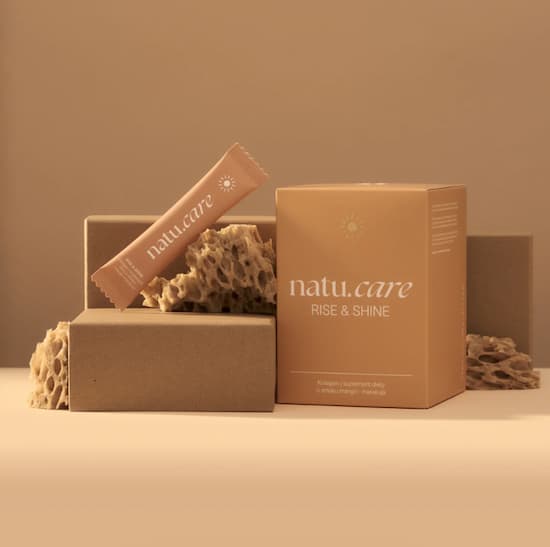
Vitamin C is one of the active ingredients in Cacao Bloom collagen.
.Vitamin B1 (thiamine)
.Vitamin B1 (thiamine) supports the production of energy from nutrients, as well as cell function. This compound shows a comprehensive effect on our body.
Properties of vitamin B1and:
- helps fight depression, .
- reduces symptoms of sepsis, .
- improves memory, .
- prevents nerve damage, .
- supports people with diabetes (takes care of proper sugar levels), .
Sources
.Thiamine is mainly found in meat, fish and whole grain products.
Sources of vitamin B1and:
- pork, .
- fasola, .
- lentils, .
- green peas, .
- macaroni, .
- rice, .
- yoghurt, .
- sunflower seeds, .
Deficiency and excess
.Vitamin B1 deficiency manifests itself with fatigue, mood deterioration, and irritabilityand. Taking even very high doses of vitamin B1 did not result in negative health symptoms . Its excess is excreted with urine.
Symptom indicative of vitamin B1 deficiency is reduced blood pressure..
 .
.
Julia SkrajdaDietitian
.APTEO VITAMINUM B COMPOSITUM
.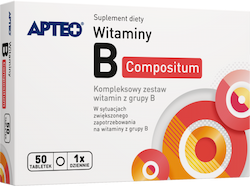
Preparation with vitamin B1, B2, B3, B5 and B6 in the composition. Supports the functioning of the nervous system and also relieves symptoms of chronic fatigue.
.Vitamin B Complex Forte
.
A dietary supplement with all B vitamins. The preparation will prove useful as a supplement to a diet deficient in these components.
.Vitamin B2 (riboflavin)
.Vitamin B2 influences digestive function, as well as brain function.
Properties of vitamin B2and:
- supports eye health, .
- prevents headaches, .
- fights free radicals, .
- supports the treatment of anaemia,
- helps to reduce the risk of chronic pain.
- positively affects the skin, (is responsible for the concentration of collagen in the body).
Ryboflavin is responsible for the synthesis of fatty acids, DNA repair, and the formation of folic acid (vitamin B9).
 .
.
Julia SkrajdaDietitian
.Resources
.Ryboflavine is found primarily in meat, as well as dairy products.
Sources of vitamin B2and:
- yoghurt, .
- cheese, .
- eggs, .
- lean beef and pork,
- beef and pork.
- beef, .
- eggs, .
- chicken breast chicken, .
- monds, .
- spinach, .
Deficiency and excess
.Vitamin B2 deficiency is rare, but if it occurs, it will manifest itself in sore throats, cracked lips or hair loss, among other symptoms. In contrast, excess riboflavin is excreted in the urine, so toxic levels of this vitamin have not been observed.
Note!
.Particularly vegans, vegetarians and pregnant women are at risk of vitamin B2 deficiency.
APTEO VITAMINUM B COMPOSITUM
.
A dietary supplement to support the function of the nervous system and also to prevent continuous fatigue.
.OLIMP Gold Vit B Forte
.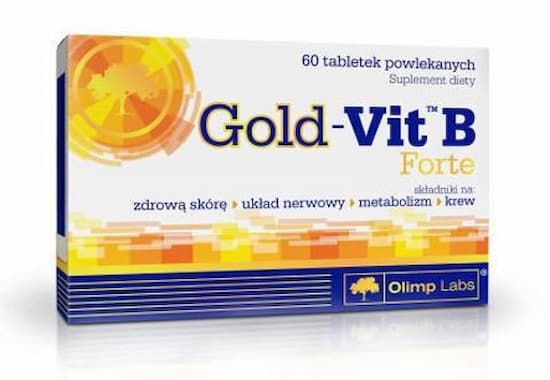
A complex of B vitamins encapsulated in tablets. A big plus: solid doses of each vitamin.
.Vitamin B3 (niacin)
.Vitamin B3 is also called niacin or vitamin PP. It controls cholesterol levels and also converts food into energy.
Properties of vitamin B3and:
- lowers blood pressure, .
- improves skin condition, .
- cures erectile dysfunction, .
- helps treat rheumatoid arthritis,
- helps cognitive function.
- supports cognitive function, .
Resources
.Vitamin B3 is provided by both animal and plant-based products.
Sources of vitamin B3and:
- beef, .
- fish, .
- poultry, .
- nuts, .
- legumes, .
- bananas, .
- beef liver, .
- pork, .
Scarcity and excess
.When you are deficient in vitamin B3, you may experience fatigue, vomiting, headaches or diarrhoea. Excess niacin, on the other hand, is very rare and is usually excreted in the urine. It is impossible to overdose on vitamin B3 from food products. However, taking too much niacin with medication can result in liver damage or type 2 diabetesand.
Caution!
.Prolonged deficiency of vitamin B3 can result in pelagra, a dangerous disease that destroys the body's cells.
Natu.Care Glow Stories
.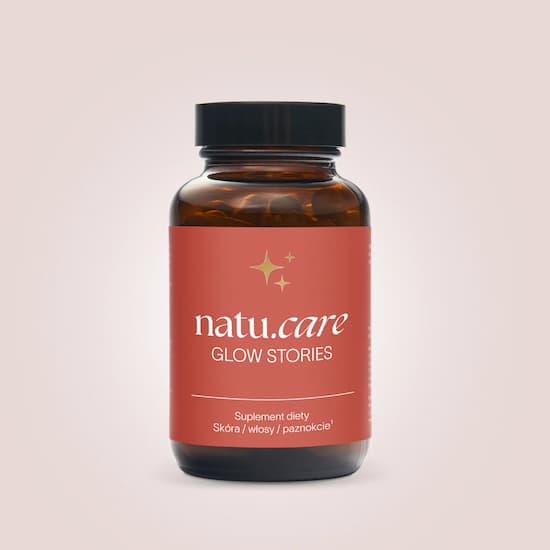
Glow Stories with niacin in the composition has a positive effect on the condition of hair, skin and nails.
Glow Stories with niacin has a positive effect on hair and nails.
Vitamin B5 (pantothenic acid)
.Vitamin B5 (pantothenic acid) is responsible for healthy growth, as well as antibody productionand. Furthermore, Lukasz Borula, MSc in pharmacy, adds that vitamin B5:
- gives shine to hair and accelerates its regeneration, .
- strengthens the immune system, .
- improves the recovery of damaged mucous membranes, .
Resources
.Pantothenic acid is found in all living cells, so the list of products that provide us with it is very long.
Sources of vitamin B5and:
- guts (liver, kidney), .
- chicken breast, .
- nuts, .
- avocado, .
- mushrooms, .
- beef, .
- milk, .
- eggs, .
- broccoli, .
- yogurt, .
- potatoes, .
Do you like avocado? It is one of the staple foods on the ketogenic diet. This restrictive diet is steadily growing in popularity, and it can be - if not followed correctly - dangerous for the body. You can find out more about it in this article: The ketogenic (keto) diet: what it is, how to follow it and what to eat + discussion of pros and cons
Deficiency
.Vitamin B5 deficiency - due to the fact that it is found in most products - is rare. However, when you experience irritability, nausea, headaches or stomach cramps, you can assume that you are deficient in pantothenic acid.
Vitamin B5 deficiency can manifest as skin changes, premature greying or concentration problems.
Lukasz Borula
Excess
.Vitamin B5 excesses are also not common, so no upper dosage limits have been established. Nevertheless, continuous intake of doses above 10 grams per day can lead to nausea, constipation or muscle pain.
SKRZYPOVITA
.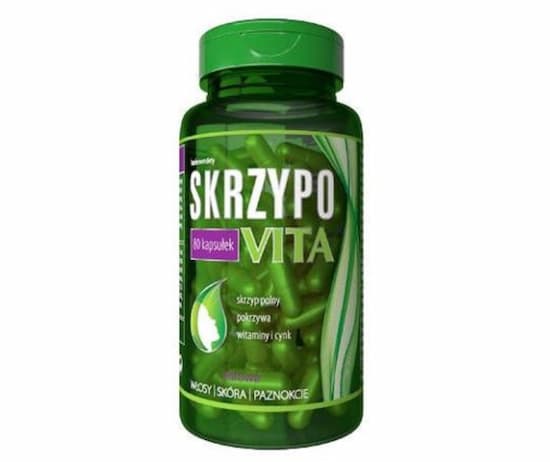
Dietary supplement with pantothenic acid to support skin, hair and nail health.
.MERZ SPEZIAL Dragees
.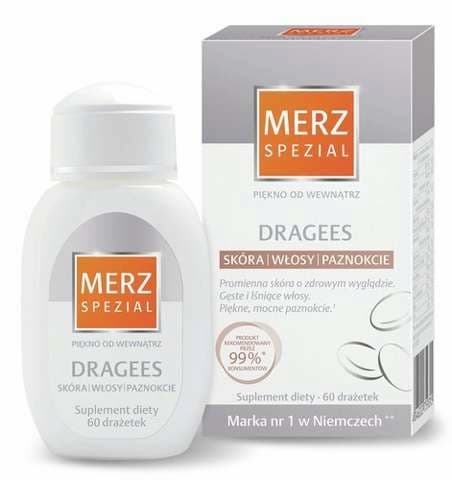
A composition of vitamins and minerals to support the condition of skin, nails and hair, encapsulated in dragees.
.Vitamin B6 (pyridoxine)
.Vitamin B6 influences brain development, as well as nervous and immune system health. It supports fat, protein and carbohydrate metabolism.
Properties of vitamin B6and:
- prevents diabetes, .
- alleviates pregnancy nausea, .
- strengthens immunity, .
- improves mood, .
- supports the treatment of anaemia, .
Resources
.A well-balanced diet will provide you with essential doses of vitamin B6. It is found in numerous foods.
Sources of vitamin B6and:
- beef, .
- beef liver, .
- tuna, .
- chickpea, .
- poultry, .
- bananas, .
- orange, .
- cantaloupe, .
Deficiency and excess
.Vitamin B6 deficiency most commonly occurs when our body lacks folic acid (vitamin B9) or vitamin B12. The most common symptoms of vitamin B6 deficiency are confusion, lowered immunity or skin problems. An excess of pyridoxine, on the other hand, is unlikely, but can manifest as nausea or neuropathy in the feet and hands.
Important
Vitamins are not everything. You also need minerals for the body to function properly. You will learn about a few of them in these articles:
GABA 500mg with vitamin B6
.
Vegan preparation with a high dose of vitamin B6 in the composition.
.VITAMINUM B6
.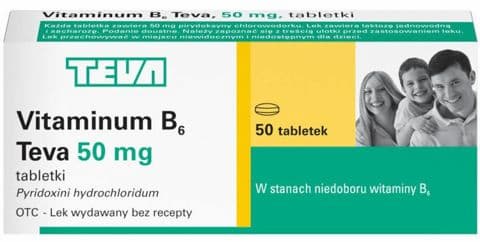
A dietary supplement recommended for people with vitamin B6 deficiency.
. .Natu.Care Sleep Well
.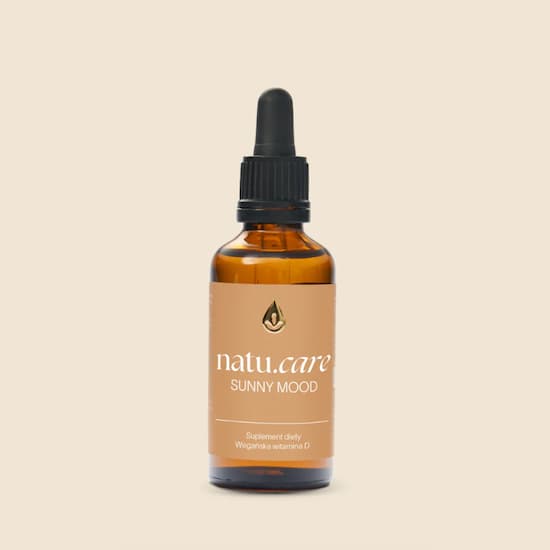
Preparation to support healthy sleep. Helps to calm down and speeds up the process of falling asleep.
.Vitamin B7 (biotin)
.Vitamin B7 (biotin) supports enzymes in the breakdown of proteins, fats and carbohydrates. It is also responsible for regulating the signals that are sent out by cells.
Properties of vitamin B7and:
- supports the treatment of diabetes, .
- supports nail, skin and hair health, .
- positively affects people with multiple sclerosis, .
If you would like to find out how biotin works for hair, I invite you to check out this article: Biotin for hair - what gives, effects, sources, ranking [TOP 15]
Biotin is responsible for the function of the immune system. This vitamin activates phagocytosis - fighting viruses and destroying free radicals..
 .
.
Julia SkrajdaDietitian
.Resources
.Biotin can be found in many foods, and its content depends on the plant variety, season or processing technique.
Sources of vitamin B7and:
- fishes, .
- offal, .
- eggs, .
- seeds, .
- nuts, .
- sweet potatoes, .
Vegetable foods containing biotin include tomatoes, cauliflower, soybeans, carrots or spinach..
 .
.
Julia SkrajdaDietitian
.Bio-deficiency and excess
.Biotin deficiency manifests itself as rashes, hair loss, dermatitis, muscle pain, fatigue, among other symptoms. An excess of vitamin B7, on the other hand, is very rare and usually produces certain symptoms: insomnia, excessive urination and increased thirstand.
Natu.Care Glow Stories
.
Glow Stories with biotin in the formulation supports the health of hair, skin and nails.
.Vitamin B9 (folic acid)
.Folic acid (vitamin B9) plays a key role in the normal development of pregnancy. It influences the development of the brain and spine of the yet-to-be-born child. This compound also affects other processes in the bodyand.
.- reduces the risk of heart disease, .
- supports brain health, .
- may support the treatment of mental illness, .
- reduces the risk of oesophageal cancer, .
- prevents fertility problems in women, .
Resources
.Dietitian Karolina Król-Lach reports that a diet rich in folic acid should not lack savoy cabbage, spinach, broccoli or pulses. Vitamin B9 can also be found in other foods.
Sources of folic acidand:
- fasola, .
- liver, .
- eggs, .
- seafood, .
- peanuts, .
- bruxelles, .
- asparagus, .
Deficiency and excess
.Folic acid deficiency is most common during pregnancy and is caused by alcoholism, genetic defects or malabsorption. The most common symptoms that are associated are fatigue, irritability, shortness of breath, difficulty concentrating or diarrhoea.
The most common symptoms that are associated are fatigue, irritability, shortness of breath, difficulty concentrating or diarrhoea.
On the other hand, excess folic acid is mostly led to by excessive doses of supplements. This results, among other things, in masking vitamin B12 deficiency or accelerating mental decline in seniorsand.
Interesting facts
.Coenzyme Q10 is known as a vitamin-like compound. Although we don't class it as a vitamin, it is crucial to our body's health. You can find out more about it in this article: Coenzyme Q10 - what it is, effects, contraindications
Natu.Care Glow Stories
.
Glow Stories is formulated with Quatrefolic®, which is the most natural and best absorbed form of folate. This supplement supports normal hair pigmentation, smooth skin, and strong and unbreakable nails.
.Vitamin B12 (cobalamin)
.Vitamin B12 is also known as cobalamin because it has cobalt as its central atom. In the body, it is primarily responsible for regulating the production of erythrocytes. Its deficiency is common in people on a meat-free diet.
Properties of vitamin B12and:
- supports the function of the nervous system, .
- positively influences mood, .
- takes part in the production of red blood cells, .
- can prevent osteoporosis, .
- supports the normal development of pregnancy, .
- may reduce the risk of macular degeneration, .
- prevents acne, skin discolouration or cracking of the corners of the mouth, .
Resources
.The requirement for vitamin B12 can easily be met by a proper diet. What should we eat so that we don't run out of cobalamin?
Sources of vitamin B12and:
- Atlantic salmon, .
- beef liver, chicken liver, veal liver, .
- herring, .
- tuna, .
- meat, .
- beef, .
- yoghurt, .
- cheese, such as mozzarella, cheddar or feta, .
- yolk, .
- indica, .
Deficiency and excess
.A lack of adequate levels of vitamin B12 in the body will give us the following symptoms: headaches, general weakness or difficulty concentrating. High doses of vitamin B12, on the other hand, can result in acne, for example, as well as health problems in people with diabetesand.
Important
.As you can see, deficiency and excess of all water-soluble vitamins can manifest very similar symptoms. It is therefore important not to treat yourself on your own. It is best to visit your doctor or have blood tests. Take care of yourself and sign up to a specialist or get the appropriate tests.
See:
APTEO vitamin B12
.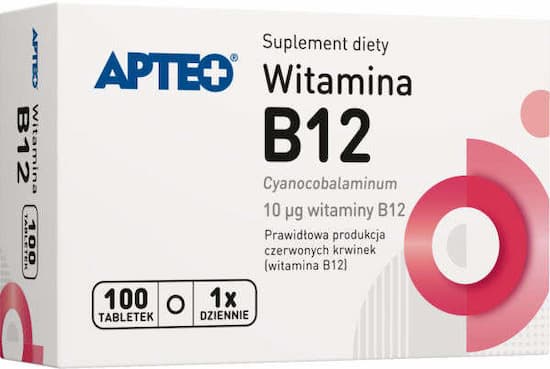
A dietary supplement for supplementing vitamin B12 deficiency. A large dose of the active substance and an attractive price speak in favour of this preparation.
.Olimp B12 MAX
.
A dietary supplement that supports the function of the nervous and skeletal systems. On the plus side, the small size of the tablets - ideal for people who have problems swallowing them.
.Daily requirements for water-soluble vitamins
.|
Vitamin . |
Males |
Women |
|
| . |
Vitamin C . |
90 mg |
75 mg |
|
Vitamin B1 (thiamine) . |
1.3 mg. |
1.1 mg |
|
|
Vitamin B2 (riboflavin) . |
1.3 mg . |
1.1 mg |
|
|
Vitamin B3 (niacin) . |
16 mg |
14 mg |
|
|
Vitamin B5 (pantothenic acid) . |
5 mg |
5 mg |
|
|
Vitamin B6 (pyridoxine) . |
1.3 mg . |
1.3 mg |
|
|
Vitamin B7 (biotin) . |
30 mcg . |
30 mcg |
|
|
Vitamin B9 (folic acid) . |
400 mcg . |
400 mcg |
|
|
Vitamin B12 (cobalamin) . |
2.4 mcg. |
2.4 mcg |
Natu.Care Premium Magnesium + Vitamin B6
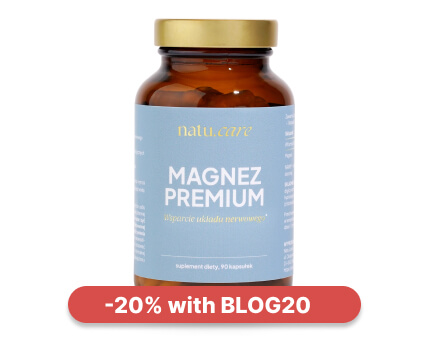
- Magnesium content per day: 305 mg
- Additional active ingredients: Vitamin B6 (2.1 mg)
- Form: capsules
- Serving size: 3 capsules per day
- Sufficient for: 30 days
Product description
The Premium Magnesium + Vitamin B6 dietary supplement is a comprehensive product that combines three organic forms of magnesium (citrate, malate, and diglycinate) and vitamin B6 in highly absorbable forms.
Magnesium is an essential mineral without which our bodies cannot function properly. It supports the immune, nervous, and muscular systems, maintains electrolyte balance, and is involved in cell division and the regulation of mental functions.
Research shows that magnesium supplementation is even more effective when accompanied by vitamin B6, which is included in our product. Vitamin B6 is responsible for the proper functioning of the nervous and immune systems, as well as the proper functioning of the heart.
If you want to safely get rid of feelings of fatigue, concentration problems, hair loss, muscle cramps, trembling, or irritability, reach for Premium Magnesium from Natu.Care, tested by the independent, certified laboratory J.S. Hamilton Poland.
Pros and cons
Pros
- Supports the proper functioning of the nervous and immune systems.
- Reduces feelings of fatigue and tiredness.
- Maintains proper psychological functions.
- The purity of the ingredients (free from anti-caking agents, artificial fillers, and additives such as titanium dioxide, microcrystalline cellulose, talc, magnesium stearate, and silicon dioxide) has been confirmed by laboratory tests.
- High absorption of ingredients.
- Soft capsules that are easy to swallow.
- Suitable for vegetarians and vegans.
Cons
- None.
Additional information
Take with a meal, 3 capsules per day.
The capsules should be taken with at least 250 ml of water.
If you have trouble sleeping, it is advisable to take 1 capsule in the morning and 2 capsules in the evening, no later than 4 hours before bedtime.
Avoid combining with products high in calcium (milk, yogurt, cheese), as this may negatively affect magnesium absorption.
Pregnant and breastfeeding women should consult a doctor before starting supplementation.
User review
I’m very impressed with the speed of delivery. The product itself is of high quality and absorbs well. After two weeks of supplementation, I’ve noticed a significant improvement in muscle recovery, especially during periods of intense training. I highly recommend it!
Natu.Care Vitamin D 2000 UI
Product description
Vitamin D plays a crucial role in our health and well-being. It affects calcium and phosphate metabolism, which translates to healthy bones and teeth. It also helps regulate the immune system, and studies indicate its influence on the functioning of the nervous system.
Vitamin D, although called a “vitamin,” is actually a prohormone that our body produces on its own, primarily under the influence of sunlight. Unfortunately, our modern lifestyle contributes to deficiencies of this essential vitamin. Working in enclosed office buildings, using (necessary!) SPF creams, and covering the body with clothing all make it very difficult, if not impossible, to obtain adequate levels of vitamin D from sunlight. This is why appropriate, year-round supplementation is so crucial.
Vitamin D from Natu.Care is a well-tested vitamin D3 suspended in safflower oil, a plant known for its numerous health benefits. The convenient, easy-to-swallow capsule will make supplementation a part of your daily, healthy routine, improving your overall well-being.
Pros and cons
Pros:
- Ensures proper functioning of the immune system
- Supports the maintenance of healthy bones and teeth
- Maintains proper heart, kidney, and muscle function
- Tested by an independent, certified laboratory
- Convenient and easy-to-swallow capsule
- Clean composition - free from added sugar, gluten, GMOs, lactose, and without preservatives or colorants
Cons:
- None.
Additional Information
Pregnant women and breastfeeding mothers should consult a doctor before using the product. This dietary supplement is intended for a healthy adult population up to the age of 75.
Collagen Booster - Glow Stories
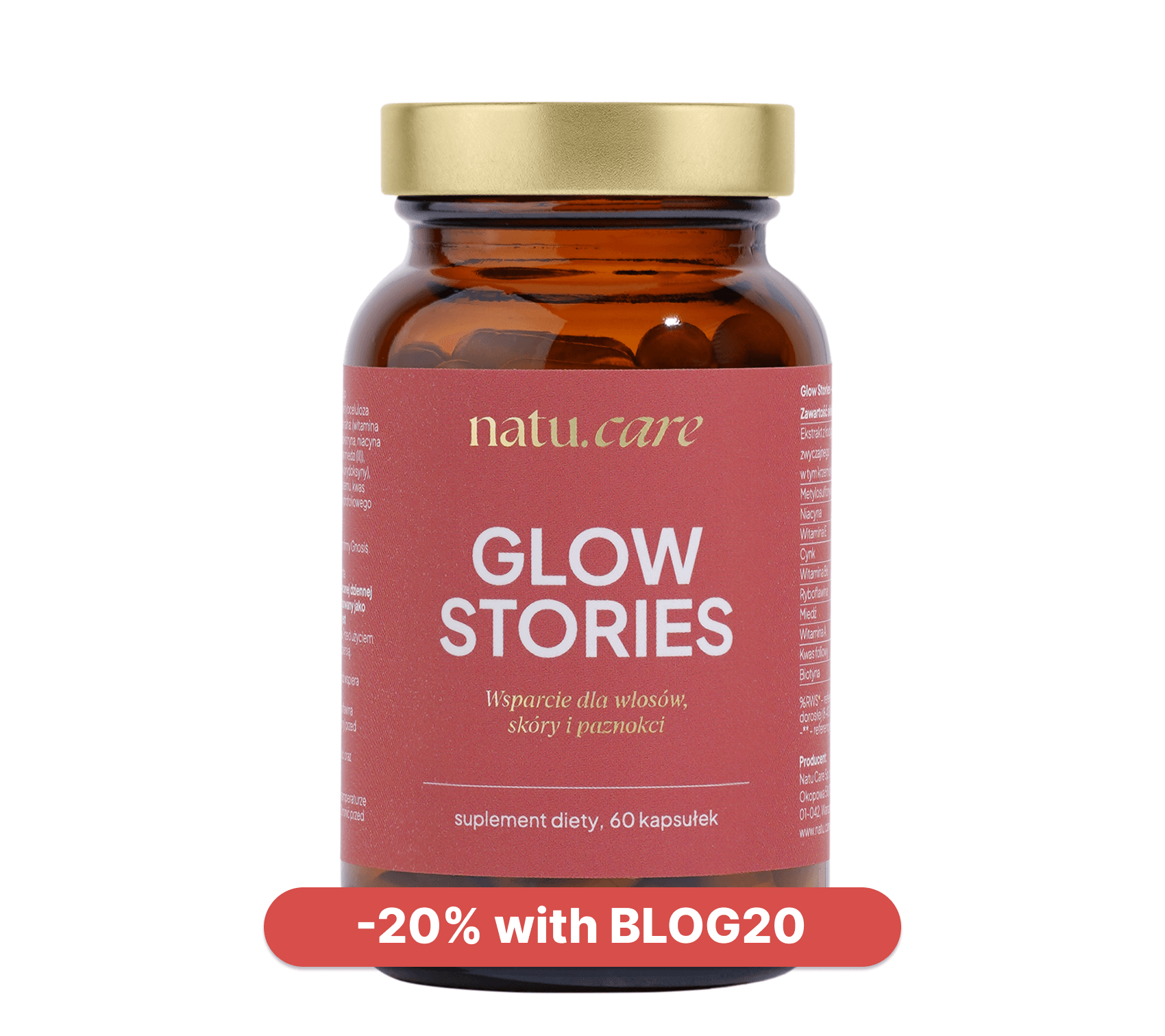
- Active ingredients: bamboo shoot extract, Quatrefolic®, L-Methionine, L-cysteine, vitamin E, vitamin A, niacin (vitamin B3), vitamin B6, vitamin B2 (riboflavin), biotin, zinc, copper
- .
- Form: capsules
- .
- Dose: 1 capsule per day
- .
- Sufficient for: 60 days
- .
Product description
A dietary supplement containing vitamins, minerals and plant extracts thatósupport the skinóhand, hair and nails. The product is especially distinguished by the form of folate – it is Quatrefolic, whichós absorbed very well and is natural.
In addition to valuable vitamins and minerals, such as vitamin A, E, B3, B2 and biotin, the formula contains bamboo shoot extract, whichóry further enhances your beauty.
Pros and cons
A dietary supplement containing vitamins, minerals and plant extracts thatósupport the skinóhand, hair and nails. The product is especially distinguished by the form of folate – it is Quatrefolic, whichós absorbed very well and is natural.
In addition to valuable vitamins and minerals, such as vitamin A, E, B3, B2 and biotin, the formula contains bamboo shoot extract, whichóry further enhances your beauty.
Additional information
A dietary supplement containing vitamins, minerals and plant extracts thatósupport the skinóhand, hair and nails. The product is especially distinguished by the form of folate – it is Quatrefolic, whichós absorbed very well and is natural.
In addition to valuable vitamins and minerals, such as vitamin A, E, B3, B2 and biotin, the formula contains bamboo shoot extract, whichóry further enhances your beauty.
Yango Multivitamin for Women
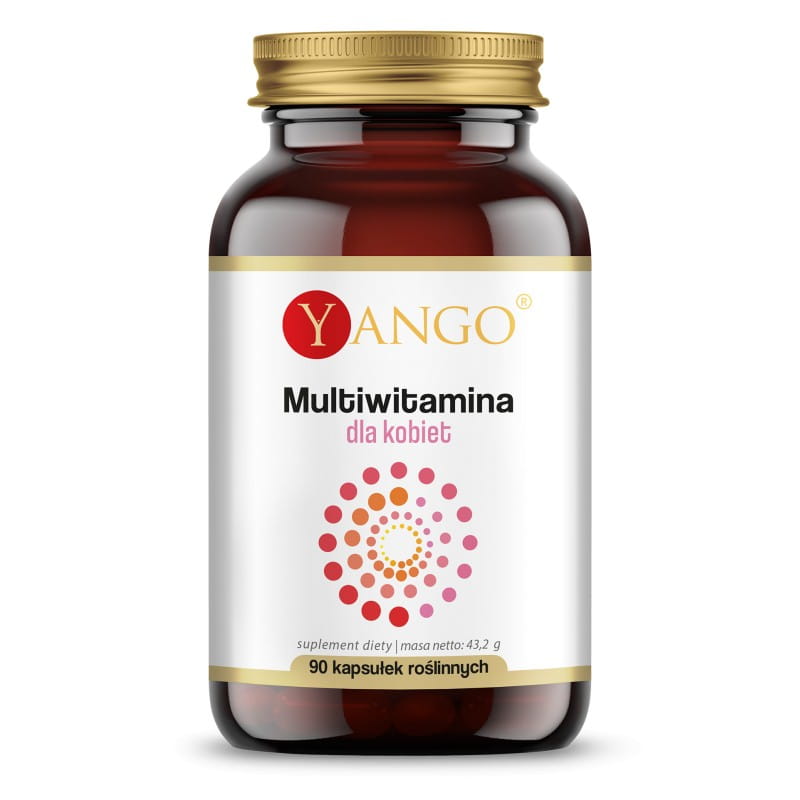
- Most important active ingredients: vitamin A, vitamin C, vitamin D3, vitamin E, vitamin B1, vitamin B2, vitamin B3, vitamin B6, vitamin B9 (folic acid), vitamin B12, vitamin B7 (biotin), vitamin B5 (pantothenic acid), vitamin K2, zinc, selenium.
- Form: liquid .
- Dose: 15 ml per day .
- Packaging: 500 ml .
Product description
Multivitamin for women with up to 26 active ingredients thatósupport the body from within. The product also contains minerals and even collagen, which supports the hair, skin and nails. The liquid form makes it easy to supplement – the product has a fruity taste.
Pros and cons
Multivitamin for women with up to 26 active ingredients thatósupport the body from within. The product also contains minerals and even collagen, which supports the hair, skin and nails. The liquid form makes it easy to supplement – the product has a fruity taste.
Additional information
Multivitamin for women with up to 26 active ingredients thatósupport the body from within. The product also contains minerals and even collagen, which supports the hair, skin and nails. The liquid form makes it easy to supplement – the product has a fruity taste.
Yango multivitamin for men
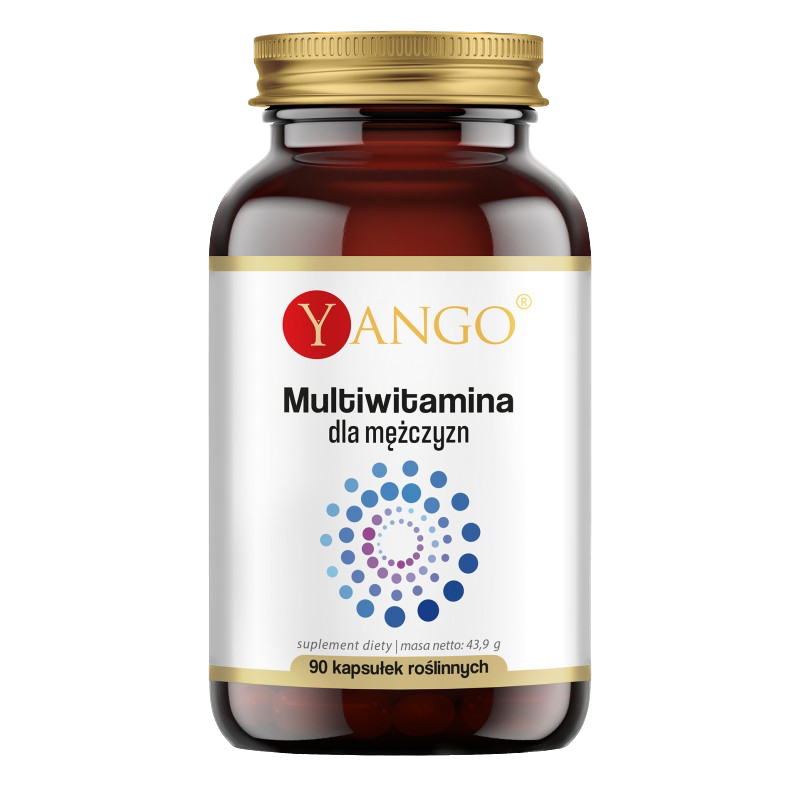
- Most important active ingredients: vitamin A, vitamin C, vitamin D3, vitamin E, vitamin B1, vitamin B2, vitamin B3, vitamin B6, vitamin B9 (folic acid), vitamin B12, vitamin B7 (biotin), vitamin B5 (pantothenic acid), vitamin K2, zinc, selenium.
- Form: liquid .
- Dose: 15 ml per day .
- Packaging: 500 ml .
Product description
Multivitamin for men with up to 26 active ingredients thatóre support the body from the inside. The product also contains minerals and even collagen, whichóry supports the hair skinóhand and nails. The liquid form makes it easy to supplement – the product has a fruity taste.
Pros and cons
Multivitamin for men with up to 26 active ingredients thatóre support the body from the inside. The product also contains minerals and even collagen, whichóry supports the hair skinóhand and nails. The liquid form makes it easy to supplement – the product has a fruity taste.
Additional information
Multivitamin for men with up to 26 active ingredients thatóre support the body from the inside. The product also contains minerals and even collagen, whichóry supports the hair skinóhand and nails. The liquid form makes it easy to supplement – the product has a fruity taste.
OLIMP Gold-Vit A+E z wiesiołkiem i biotyną
Product description
Vitamin A plus E with added evening primrose oil and biotin. Supports hair, skin and nail health, as well as the cardiovascular system.
Why it's worth it:
This is an interesting form of vitamin A plus E - the manufacturer has placed the active substances in pellet form. As the pharmacist explains, this form allows the supplement to be prolonged. On the big plus side, the content of biotin and evening primrose oil in the composition.
The former prevents split ends in the hair and also supports nail health. Evening primrose oil, on the other hand, has a positive effect on the cardiovascular system.
Fat-soluble vitamins
.Fat-soluble vitamins include: vitamin A, D, E and K. Unlike water-soluble vitamins, we do not excrete them in the urine - our body stores them. These compounds are found in fat-rich foods.
Vitamin A
.Vitamin A is made up of several chemical compounds. It includes retinol and its derivatives, as well as some carotenoids, which we call provitamin A. Vitamin A is crucial for the health of the bodyand.
Properties of vitamin Aand:
.- supports eye health (prevents macular degeneration), .
- has antioxidant effects, .
- increases immunity, .
- activates cancer, .
- prevents acne, .
- promotes fertility, .
Resources
.Vitamin A in its preferred form retinol is mainly found in dairy products and some meats. Beta-carotene, on the other hand, is mainly contained in selected fruits and vegetables.
Sources of vitamin Aand:
- tomatoes, .
- cabbage, .
- spinach, .
- broccoli, .
- sweet potatoes, .
- carrots, .
- beef liver, .
- red pepper, .
- mackerel, .
- beef, .
Deficiency
.Vitamin A deficiency can be caused by poor diet, malabsorption, or liver problems (such as cirrhosis or fatty liver). Its symptoms include dry skin, night blindness and, in the long term, even result in infertilityand.
Treatment of most liver problems involves a balanced diet, quitting alcohol, and taking appropriate medication. Together with a master pharmacist, I have prepared a compilation of the best liver remedies. You can find them in this article: Best liver tablets - 12 suggestions from a pharmacist
.Excess
.A vitamin A excess is just as dangerous as a deficiency. There are two types of hypervitaminosis: acute and chronic. The former manifests itself with nausea, vomiting, and dizziness, among other symptoms, and is caused by a single intake of a huge dose (more than 200 000 mcg) of vitamin Aand.
On the other hand, chronic hypervitaminosis leads to long-term intake of too much (more than 10 000 mcg per day) vitamin A. Its symptoms include headaches, diarrhoea or skin problems.
Natu.Care Collagen Premium
.
Mango-maracuja flavoured collagen with vitamin A and E in the formulation.
Vitamin D
.Vitamin D consists of vitamin D2 (found in plants and fungi) and vitamin D3 (present in the skin tissue of animals and humans). Research suggests that vitamin D3 lasts longer, is more effective and stable, and is better at raising serum vitamin D concentrations, so it is this that we will focus onand.
.- supports calcium and phosphate metabolism - strengthens bones, .
- supports the immune system, .
- has a positive effect on the cardiovascular system, .
- can prevent dementia and Alzheimer's disease, .
Sources
.Mostly, vitamin D should be taken in the form of supplements. More often than not, diet alone will not be sufficient to cover the full requirement for the sunshine vitamin. Nevertheless, it is worth taking care to supplement your diet with products rich in this compound.
Sources of vitamin Dand:
- beef, .
- beef liver, .
- tuna, .
- beef, .
- sardines, .
- carb, .
- cheeses: gouda, gorgonzola, camembert, .
- yolk, .
Deficiency and excess
.Vitamin D3 deficiency is most common in people living in regions with little sunshine (e.g. Poland). Common symptoms of this condition include: frequent infections, bone pain, and general fatigueand.
Excess vitamin D3 is only caused by too much intake of medication or supplements and results in vomiting, nausea, and increased thirst, among other things .
You can learn more about vitamin D from these articles:
.- Vitamin D - Dosage. Current standards and recommendations 2022 .
- What is vitamin D in? The three most important sources of vitamin D
- Vitamin D3K2 - do you need to combine? Properties and expert opinion
- The best vitamin D3 - a review of 21 products with an expert
- Vitamin D3 drops - benefits and uses
Natu.Care Sunny Mood
.
Vegan vitamin D3 produced from marine algae. The preparation in the form of drops encourages with its simple composition, convenient form of administration, as well as high bioavailability.
.Vitamin E
.Vitamin E consists of as many as eight compounds, but the most important and valuable for our body is alpha-tocopherol. This compound neutralises free radicals and also supports the immune and circulatory systemsand.
Properties of vitamin Eand:
.- reduces the risk of heart disease, .
- relieves menstrual pain, .
- promotes skin health, .
- supports lung function,
- enhances lung function.
- promotes wound healing, .
Resources
.Vitamin E can easily be supplied to the body through the diet. It can be found in numerous food products.
Sources of vitamin Eand:
- sunflower oil, safflower oil, soybean oil, .
- sunflower seeds, .
- monds, .
- pumpkin, .
- asparagus, .
- avocado, .
- mango, .
- peanuts, .
- cabbage, .
- spinach, .
Deficiency and excess
.Vitamin E deficiency is rare and the most common causes are an unbalanced diet or malabsorption. Symptoms of a lack of this vitamin in the body, on the other hand, include vision problems, reduced immunity, and loss of control over body movements.
Periodic overdose
It is impossible to overdose on vitamin E from food. However, it is possible to lead to its excess by using excessive doses of supplements. For this reason, an upper limit of vitamin E intake has been set - this is 1000 mg.
VITAMINUM A+E
.
Vitamin A+E in the form of an OTC medicine. Supports the treatment of growth disorders, twilight vision, and mucosal lesions
.A+E-Vitum
.
Vitamin A+E with a solid dose of active substances without dyes and preservatives in the formulation.
.CAPIVIT A+E Forte system
.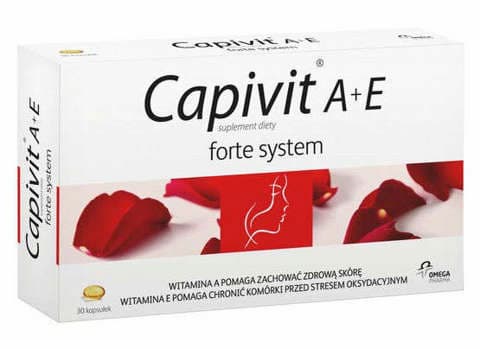
Vitamin A+E to support the condition of the skin and mucous membranes. Not suitable for vegans.
. .Vitamin K
.Vitamin K is not one, but three organic compounds. It consists of vitamin K1, vitamin K2 and vitamin K3. What are the effects of vitamin K?
Properties of vitamin Kand:
- supports normal blood clotting, .
- influences bone tissue production, .
- supports the function of the cardiovascular system, .
- takes part in the calcification of bone tissue, .
- strengthens the immune system, .
Source
.Vitamin K should be taken daily with the diet.
Sources of vitamin Kand:
- cabbage, .
- kale, .
- spinach, .
- broccoli, .
- soybeans, .
- eggs, .
- cheese, .
Deficiency and excess
.Vitamin K deficiency is most commonly associated with poor diet and manifests itself as hematuria, prolonged wound healing, and intestinal disorders, among other symptoms. In contrast, an excess of this vitamin is rare and includes symptoms such as excessive sweating or feeling hotand.
If you are missing information on vitamin K2 or want to know if you need to combine this compound with vitamin D3, I invite you to check out these articles:
- Vitamin K2 - properties, occurrence, contraindications
- Vitamin D3K2 - need to combine? Properties and expert opinion
K2-Vitum forte
.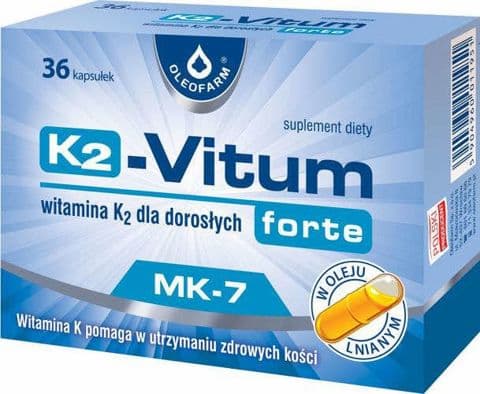
Preparation with vitamin K2 in the composition. Allows you to supplement the daily requirement of this compound.
.Vitamin K2 MK-7
.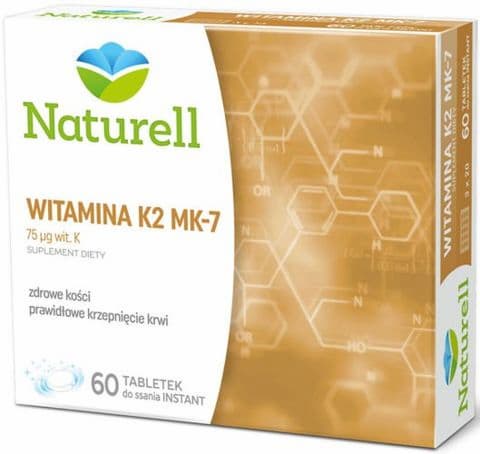
Dietary supplement in the form of lozenges. On the plus side, a solid dose of the active substance.
.Daily requirements for fat-soluble vitamins
.|
Vitamin . |
Males |
Women |
|
| . |
Vitamin A . |
900 mcg . |
700 mcg |
|
Vitamin D |
15 mcg . |
15 mcg |
|
|
Vitamin E |
10 mg |
8 mg |
|
|
Vitamin K . |
65 mcg . |
55 mcg |
What vitamins should we take on a daily basis?
.The vast majority of vitamins should be taken with the diet. Most often, however, we are not able to fill the need for vitamin D (especially in winter), so it is worth considering taking supplements with this compound. Some people should also make sure to take selected B vitamins (this is especially true for vegans and vegetarians).
Remember, however, that excess vitamins in the body can be very dangerous. Therefore, before you start supplementation, see your doctor or have a blood test - so you will know what vitamins and minerals your body needs.
Natu.Care Sunny Mood
.
Vegan vitamin D3 in drop form, produced from marine algae.
.What vitamins should vegans supplement?
.Vegetarians and vegans are at risk of vitamin B12 deficiencyand. Another compound that vegans may be deficient in is vitamin D. Remember, however, that vitamins are not everythingand. Those on a vegan or vegetarian diet should also consider supplementation:
- omega-3 fatty acids,
- iron, and
- iron, .
- zinc, .
- calcium, .
- iodine, .
Want to find out which is the best zinc in tablets? Take a look at this article: Zinc in tablets - properties, dosage, ranking [TOP 15]
Vitamins to boost immunity - which ones to choose?
.Many vitamins have a positive effect on the immune system, but a few in particular support it. If you're looking for something to boost immunity, make sure you take vitamin C, vitamin B6 and also vitamin E. Immunity-supporting minerals, on the other hand, are primarily zinc and seleniumand.
What vitamins are mutually exclusive?
.Do not take vitamin C with vitamin B12 at the same time. This may interfere with the absorption of the other compound. Furthermore, vitamins can also react with selected minerals, such as selenium or copper. Therefore, it is always advisable to check with your doctor before starting supplementsand.
What vitamins for pregnant women?
.Pregnancy is a time when your body needs significantly more vitamins and minerals. When you are expecting a baby, you should ensure that you consume:
- Folic acid,
- iron, .
- calcium, .
- vitamin D, .
- omega-3 fatty acids,
- folic acid,
- vitamin D,
- vitamin A.
- B-vitamins,
- vitamin C.
- vitamin C, .
- vitamin B12, .
- vitamin D, .
- iodine, .
- iron, .
- vitamin K, .
- stop smoking cigarettes and drinking alcohol, .
- take care to maintain a healthy weight, .
- stay on a balanced diet, .
- Vitamin A+E .
- Biotin for hair .
- Vitamin D - dosage .
- Vitamin D overdose
- Maximum dose of vitamin D .
- What is vitamin D
- Vitamin D3K2
- Coenzyme Q10
- Vitamin B12 deficiency
- Multivitamin
- Vitamins are a group of 13 organic chemical compounds.
- The water-soluble vitamins are: vitamin C, B1, B2, B3, B5, B6, B7, B9, and B12.
- The water-soluble vitamins are: vitamin C, B1, B2, B3, B5, B6, B7, B9, and B12.
- Fat-soluble vitamins include vitamin A, D, E and K. .
- Most people in Poland should supplement vitamin D. .
- Do not take vitamin C with vitamin B12 at the same time. .
- Pregnant and breastfeeding women should take special care to ensure adequate vitamin levels in the body.
- Pregnant and breastfeeding women should take special care to ensure adequate vitamin levels in the body.
- Seniors should consider supplementation with vitamin D, B6, B12, as well as calcium. .
- Iron
Note!
.Only and exclusively a specialist can recommend that you take supplements if you are pregnant. By acting on your own, you could harm yourself or your baby (the exception is folic acid, which should be taken even before you start trying for a baby)and.
Vitamins and breastfeeding
.During breastfeeding it is much easier to develop a vitamin deficiency. Therefore, it may be necessary to takeand:
Remember that you may also need other supplements. Therefore, always consult your doctor, who can tell you which supplements to take.
Pregnancy planning
Pregnancy planning and vitamins - what to supplement?
.Every woman who is planning to become pregnant, should supplement folic acid. This vitamin is crucial for the health of the baby, and a deficiency is most dangerous when the pregnancy is still undiscovered. If you want to speed up the process of getting pregnant, you should also:
What vitamins to take after 65 years of age?
.Seniors are particularly vulnerable to vitamin and mineral deficiencies. Seniors should consider supplementation with vitamin D, vitamin B6, vitamin B12, and calcium. More often than not, it is these compounds that people over 50-60 years of age are lackingand.
See also:
.Summary
.FAQ
.What vitamins for fatigue and lack of energy?
.Most often, a deficiency in water-soluble vitamins leads to chronic fatigue and lack of energy. However, you may be lacking vitamin D or vitamin A, or even some minerals, such as iron.
If you feel your lack of energy may be linked to a deficiency - go for a blood test.
Do mushrooms have vitamins?
.Yes, fresh mushrooms such as chanterelles can contain sizable deposits of vitamin D. What's more, some mushrooms (e.g. shiitake) also contain vitamin A and selected B vitamins - vitamin B1 (thiamine), vitamin B2 (riboflavin), vitamin B3 (niacin) and vitamin B6 (pyridoxine).
.What vitamins does milk have?
.Milk mainly contains riboflavin (vitamin B2), as well as vitamin A and vitamin B12. However, we can find most water-soluble and fat-soluble vitamins (in smaller amounts) in this drink.
What's more, in addition to vitamins, milk also contains many minerals, such as magnesium, potassium, iodine, zinc, phosphorus or calcium.
Can you take pregnancy vitamins without being pregnant?
.Yes, you can take pregnancy vitamins without being pregnant if you need them. Always check with a specialist before starting supplementation. He or she should be the one to give you the green light or prohibit you from taking a particular product.
Eggs - what vitamins do they provide us with?
.Eggs contain vitamin A, vitamin D, vitamin B2, vitamin B5 (pantothenic acid), vitamin B7 (biotin), vitamin B9 (folic acid), and vitamin B12. In addition to these, these products provide us with several minerals: iodine, selenium and phosphorus. Therefore, eggs are the way to go for a healthy breakfast or lunch.
How to replenish vitamin B12 deficiency quickly?
.To quickly replenish vitamin B12 deficiency, incorporate foods rich in this vitamin into your diet, such as liver, eggs, milk, fish or seafood. Also consider supplementation with vitamin B12. Adult women and men should take 2.4 mcg of vitamin B12 daily.
For severe deficiency, consult your doctor about vitamin B12 injections or sublingual tablets, which are effective in delivering the vitamin directly to the body.
How much vitamin D to take daily?
.Take 15 mcg of vitamin D daily for adults and 10 mcg for infants (0-11 months) and 15 mcg for children. Remember that the specific vitamin D dosage may vary depending on age, weight and individual needs. Therefore, if you have the option, consult your doctor before starting supplementation.
Sources
.See all
.Ashoori, M., & Saedisomeolia, A. (2014). Riboflavin (vitamin B2) and oxidative stress: A review. British Journal of Nutrition, 111(11), 1985-1991. https://doi.org/10.1017/S0007114514000178
Bailey, R. L., Jun, S., Murphy, L., Green, R., Gahche, J. J., Dwyer, J. T., Potischman, N., McCabe, G. P., & Miller, J. W. (2020). High folate or folate combined with low vitamin B-12 status: Potential but inconsistent association with cognitive function in a nationally representative cross-sectional sample of US older adults participating in the NHANES. The American Journal of Clinical Nutrition, 112(6), 1547-1557. https://doi.org/10.1093/ajcn/nqaa239
Balta, I., & Ozuguz, P. (2014). Vitamin B12-induced acneiform eruption. Cutaneous and Ocular Toxicology, 33(2), 94-95. https://doi.org/10.3109/15569527.2013.808657
Bell, R. G. (1978). Metabolism of vitamin K and prothrombin synthesis: Anticoagulants and the vitamin K--epoxide cycle. Federation Proceedings, 37(12), 2599-2604.
.Calderón-Ospina, C. A., & Nava-Mesa, M. O. (2019). B Vitamins in the nervous system: Current knowledge of the biochemical modes of action and synergies of thiamine, pyridoxine, and cobalamin. CNS Neuroscience & Therapeutics, 26(1), 5-13. https://doi.org/10.1111/cns.13207
.CDC. (2022, September 9). Folic Acid: The Best Tool to Prevent Neural Tube Defects. Centers for Disease Control and Prevention. https://www.cdc.gov/ncbddd/folicacid/features/folic-acid-helps-prevent-some-birth-defects.html
GASKINS, A. J., & CHAVARRO, J. E. (2018). Diet and Fertility: A Review. American journal of obstetrics and gynecology, 218(4), 379-389. https://doi.org/10.1016/j.ajog.2017.08.010
House, A. A., Elyashiv, M., Cattran, D. C., Churchill, D. N., Oliver, M. J., Fine, A., Dresser, G. K., & Spence, J. D. (2010). Effect of B-Vitamin Therapy on Progression of Diabetic Nephropathy: A Randomized Controlled Trial. JAMA, 303(16), 1603-1609. https://doi.org/10.1001/jama.2010.490
If High Folic Acid Aggravates Vitamin B12 Deficiency What Should Be Done about It? | Nutrition Reviews | Oxford Academic. (n.d.). Retrieved 11 April 2023, from https://academic.oup.com/nutritionreviews/article/65/10/451/1879937
Laetrile (amygdalin or vitamin B17). (n.d.). Retrieved April 11, 2023, from https://www.cancerresearchuk.org/about-cancer/treatment/complementary-alternative-therapies/individual-therapies/laetrile
Lam, N. S. K., Long, X. X., Li, X., Saad, M., Lim, F., Doery, J. C., Griffin, R. C., & Galletly, C. (2022). The potential use of folate and its derivatives in treating psychiatric disorders: A systematic review. Biomedicine & Pharmacotherapy, 146, 112541. https://doi.org/10.1016/j.biopha.2021.112541
Li, Y., Huang, T., Zheng, Y., Muka, T., Troup, J., & Hu, F. B. (n.d.). Folic Acid Supplementation and the Risk of Cardiovascular Diseases: A Meta-Analysis of Randomized Controlled Trials. Journal of the American Heart Association, 5(8), e003768. https://doi.org/10.1161/JAHA.116.003768
Ma, F., Li, Q., Zhou, X., Zhao, J., Song, A., Li, W., Liu, H., Xu, W., & Huang, G. (2019). Effects of folic acid supplementation on cognitive function and Aβ-related biomarkers in mild cognitive impairment: A randomised controlled trial. European Journal of Nutrition, 58(1), 345-356. https://doi.org/10.1007/s00394-017-1598-5
Mahabadi, N., Bhusal, A., & Banks, S. W. (2022). Riboflavin Deficiency. In StatPearls. StatPearls Publishing. http://www.ncbi.nlm.nih.gov/books/NBK470460/
Mascolo, E., & Vernì, F. (2020). Vitamin B6 and Diabetes: Relationship and Molecular Mechanisms. International Journal of Molecular Sciences, 21(10), 3669. https://doi.org/10.3390/ijms21103669
Office of Dietary Supplements-Biotin. (n.d.). Retrieved 17 March 2023, from https://ods.od.nih.gov/factsheets/Biotin-HealthProfessional/
Office of Dietary Supplements-Thiamin. (n.d.). Retrieved 17 March 2023, from https://ods.od.nih.gov/factsheets/Thiamin-HealthProfessional/
Office of Dietary Supplements-Vitamin A and Carotenoids. (n.d.). Retrieved 17 March 2023, from https://ods.od.nih.gov/factsheets/vitamina-consumer/
Office of Dietary Supplements-Vitamin C. (n.d.). Retrieved 17 March 2023, from https://ods.od.nih.gov/factsheets/VitaminC-HealthProfessional/
Rolle, T., Dallorto, L., Rossatto, S., Curto, D., & Nuzzi, R. (2020). Assessing the Performance of Daily Intake of a Homotaurine, Carnosine, Forskolin, Vitamin B2, Vitamin B6, and Magnesium Based Food Supplement for the Maintenance of Visual Function in Patients with Primary Open Angle Glaucoma. Journal of Ophthalmology, 2020, e7879436. https://doi.org/10.1155/2020/7879436
Saleem, F., & Soos, M. P. (2022). Biotin Deficiency. In StatPearls. StatPearls Publishing. http://www.ncbi.nlm.nih.gov/books/NBK547751/
.Tsugawa, N., & Shiraki, M. (2020). Vitamin K Nutrition and Bone Health. Nutrients, 12(7), Article 7. https://doi.org/10.3390/nu12071909
Tucker, K. L., Hannan, M. T., Qiao, N., Jacques, P. F., Selhub, J., Cupples, L. A., & Kiel, D. P. (2005). Low plasma vitamin B12 is associated with lower BMD: The Framingham Osteoporosis Study. Journal of Bone and Mineral Research: The Official Journal of the American Society for Bone and Mineral Research, 20(1), 152-158. https://doi.org/10.1359/JBMR.041018
Wiley, K. D., & Gupta, M. (2022). Vitamin B1 Thiamine Deficiency. In StatPearls. StatPearls Publishing. http://www.ncbi.nlm.nih.gov/books/NBK537204/
.Young, L. M., Pipingas, A., White, D. J., Gauci, S., & Scholey, A. (2019). A Systematic Review and Meta-Analysis of B Vitamin Supplementation on Depressive Symptoms, Anxiety, and Stress: Effects on Healthy and 'At-Risk' Individuals. Nutrients, 11(9), 2232. https://doi.org/10.3390/nu11092232
Zhao, Y., Guo, C., Hu, H., Zheng, L., Ma, J., Jiang, L., Zhao, E., & Li, H. (2017). Folate intake, serum folate levels and esophageal cancer risk: An overall and dose-response meta-analysis. Oncotarget, 8(6), 10458-10469. https://doi.org/10.18632/oncotarget.14432
Editorials
Meet the team


![Vitamin B12 - where it occurs in the diet and in products [table].](https://cdn-resources.natu.care/uploads/1/balanced_diet_nutrition_healthy_eating_concept_food_sources_rich_vitamin_b12_cobalamin_kitchen_table_1_b84f75bda2.jpg)
Find out where vitamin B12 is found and which products will provide you with it.

Vitamin PP also known as niacin or vitamin B3 supports the proper functioning of the body.
![What is NMN? Effects, effects, side effects [supplements].](https://cdn-resources.natu.care/uploads/1/science_background_with_molecule_atom_abstract_structure_science_medical_background_3d_illustration_1_a5ec4d9cec.jpg)
Everything you want to know about NMN: properties, effects, safety and expert opinions.
